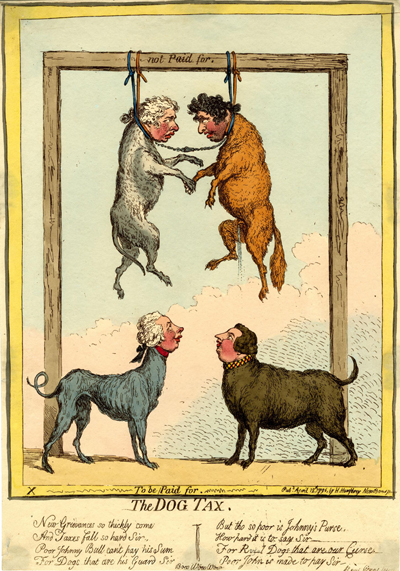The Dog Tax
As today, dogs in Britain in the late 18th century were used in hunting and sheep herding, as guards for the home, guides for the blind, and as cherished pets. But much more frequently than today, they were also significant pests, attacking and killing livestock, and most dangerously (without vaccination) carrying rabies.
The dog tax was, of course, one of those seemingly innumerable taxes and duties levied by the Pitt administration to raise revenue to continue the ongoing war with France. As Sarah Murden points out in an article on the 1796 Dog Tax in All Things Georgian, the tax had already been proposed several times earlier in the century. But it was delayed or shelved from the complex set of issues it raised: are dogs really property like a watch or a ring? When is a dog a luxury or a necessity? Can the poor be told that they can't afford a dog? Lynn Festa discusses these issues in depth in an excellent essay "Person, Animal, Thing: The 1796 Dog Tax and the Right to Superfluous Things."
But the Dog Tax was not simply a means of raising revenue. It was also created knowing full well that to avoid the tax, dogs would be shot, hanged, or drowned. In a time of failing harvests, food shortages, and popular unrest, a reduction in the dog population (and those additional, expendable mouths to feed) was one of the aims of the legislation. Indeed when Charles Dent proposed the tax, his operating assumption (as reported in the London Star April 6, 1796) was that the tax would have the effect of reducing the number of dogs in the country by half—from two million to one million.

© Trustees of the British Museum
Portraying the best known politicians of his day as dogs, Gillray illustrates both the percentage reduction and the stark choice. For every two dogs that survive (because the tax on them is paid) there would be two more that are hanged—or otherwise destroyed—(because they are NOT paid for). In this case, according to Gillray, the dogs "To be Paid for"' are the Tory Prime Minister, William Pitt, and his right hand man, Henry Dundas. The dogs "not Paid for," and consequently being hanged, are the Whigs Charles James Fox (taking a parting shot at the Tories by pissing on Dundas) and Richard Brinsley Sheridan. But if the visual image suggests that it is only the Tory ministers who are worth saving, that stark assessment is immediately complicated by the accompanying caption.
New Grievances so thickly come
And Taxes fall so hard Sir
Poor Johnny Bull can't pay his Sum
For Dogs that are his guard Sir
But tho so poor is Johnny's Purse
How hard it is to say Sir
For Royal Dogs that are our Curse
Poor John is made to pay Sir.
Because new reasons for grief increase every day, and taxes, like this one, fall hard upon the common, everyday Englishman, Gillray suggests, John Bull can no longer even afford to keep watchdogs for his home (in this case, Whigs, who argued against the dog tax) while at the same time being forced to support the Royal dogs (Tories). They are called Royal dogs, however, to associate them with the spendthrift Royal sons, whose lavish spending habits were well known.
Sources and Reading
- Commentary from the British Museum on The Dog Tax.
- "Taxing of Dogs in the eighteenth-century," All Things Georgian
- Lynn Festa, "Person, Animal, Thing: The 1796 Dog Tax and the Right to Superfluous Things,"
- Thomas Wright and R.H. Evans, Historical and Descriptive Account of the Caricatures of James Gillray #145.
- Thomas Wright and Joseph Grego, The Works of James Gillray, the Caricaturist; With the History of His Life and Times, p. 201-202.
Comments & Corrections
NOTE: Comments and/or corrections are always appreciated. To make that easier, I have included a form below that you can use. I promise never to share any of the info provided without your express permission.